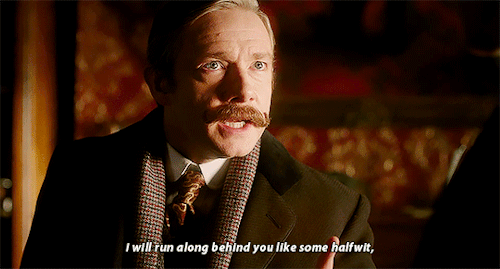theconsultinglinguist:billpottz:My dear Watson, you are allowing emotion to cloud your judgement.Wha
theconsultinglinguist:billpottz:My dear Watson, you are allowing emotion to cloud your judgement.What a stupid me reads in this scene So: TAB is in Sherlock’s mind. Then, some thoughts: -”Quite forcibly”: see the morgue scene in TLD. Sherlock knew, somewhere deep down, all along, where John’s anger (read: misplaced, stiffled, desperate, wrong love) could lead (no romanticising here)-”Which of us is the soldier and which of us the drug addict”: Everything in Sherlock’s mind palace is what he has lived. The people in his mind are not just reflections of those actually around him, he also projects what he thinks/knows about them onto them actively (Mycroft: authority, Irene: temptation/distraction -not for her. Irene’s theme is a metaphor for Sherlock’s unreqited, as he sees it, love for John. See the theme plays in HLV when he literally brings himself back to life for him). So potentially a lot of symbolism going on in there. So: this, a’drug addict’ is what Sherlock partly thinks of himself (compare “this is me, by the way, hello” scene HLV). And also what he sees himself as in comparison to John (’the soldier’ Watson). -And in his mind, Sherlock corrects (‘you are a doctor’). Only to be reminded again ‘I could break every bone in your body while naming them’. Sherlock can see through John quite clearly (two sides to him, which are indistinguishable according to MindPalaceJohn). But Sherlock wishes for the Doctor side. Take from that symbolism what you will (the army doctor occupation is in itself, a paradox: a soldier kills, a doctor saves. Morality is a strong point of contention here, I believe). -Sherlock then stares at John with his very distinct deduction glare (’you are allowing emotion to cloud your judgement’). John is, in fact, in reali life, doing exactly that. But in his mind, Sherlock perhaps is too, by ascribing to the projection of John too much? Perhaps. -MindPalaceJohn -who Sherlock wants to be the Doctor, not the paradox- then brings up the matter of promises. Ironically, perhaps (HLV). -Sherlock clings onto John for morality in his mind, even though he knows the paradoxical nature of him (it is John that calls him out on a supposed promise). Sherlock interrupts; it wasn’t really him. It was what John wrote about him. And because we are in Sherlock’s mind: he thinks John believes the things he writes about him. And he is fond of that. He is fond of the idea that John could believe that about him (he smiles). -John gets angry and calls him out out on it (”I am happy to play the fool for you”). MindPalaceJohn knows the ‘darker’ side of Sherlock, but chooses to ignore it, wanting the stories to be true. Wanting Sherlock to hold himself to a “higher standard”. This is Sherlock to himself, in the form of John. -Sherlock gets angry at John, because John thinks Sherlock sees him as a halfwit, only there to make him seem clever. So, Sherlock is angry at John for believing that - and for real life, because John here is a reflection of real John: he doesn’t want John to believe that either. -The for who and why questions; the stories to him are irrelevant. (”idiot stories”). He is trying to get to why MindPalaceJohn would think those things/want him to be better, but John, in his mind, gives him no answers. So this is where Sherlock’s knowledge about John ends, I suppose. Or where he thinks John’s care ends (”people need you to”, “for the stories”). They’re just dancing around the important matter. But Sherlock has admitted to loving John (wedding!). So, what is the point, here? It is his mind that won’t admit it? Perhaps because, in his mind, John won’t? But John also admitted to loving and caring about him most in the world (alongside Mary, ugh). So… What is all the avoiding about? Sherlock’s identity/role/importance, maybe. Or what he thinks as John’s inability to understand the depth of his feelings? No idea right now. Help? @honeybeelullaby @221bloodnun @love-in-mind-palace -- source link







